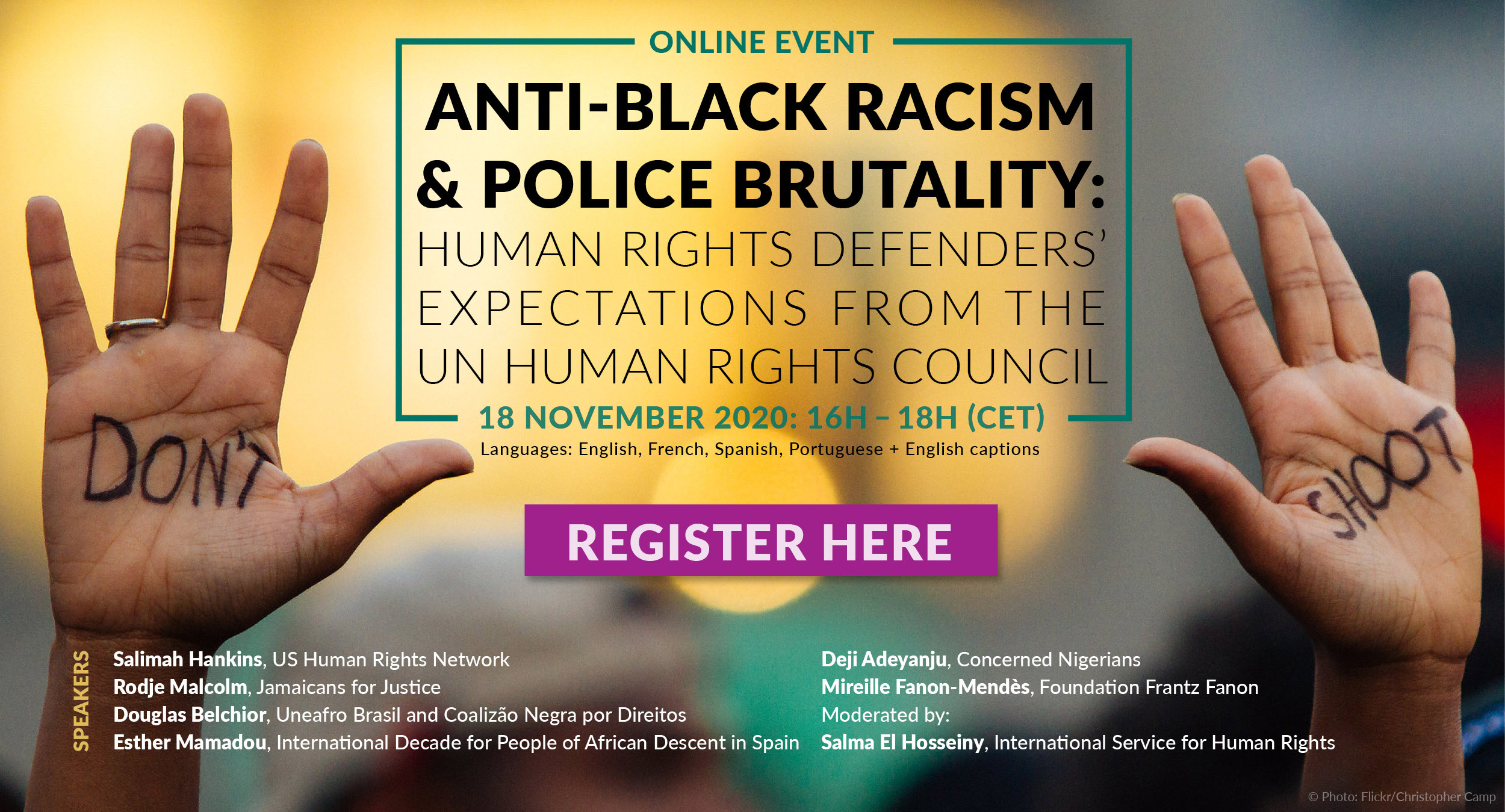
Anti-Black racism & police brutality: human rights defenders’ expectations from the UN Human Rights Council
Wednesday 18 November
16-18h CET
Interpretation in English, Spanish, Portuguese, French
Captioning in English
Join us for a conversation with human rights defenders working on police violence and/or systemic racism! Along with discussing the specfic country-contexts including how patterns of systemic racism affect women and LGBTI+ persons, they will be discussing the implementation of the Human Rights Council resolution 43/1 that mandated the UN High Commissioner for Human Rights with preparing a report on systemic racism and police violence against Africans and people of African descent.
Panellists:
- Salimah Hankins, U.S. Human Rights Network
- Mireille Fanon-Mendès France, Fondation Frantz Fanon
- Douglas Belchior, Uneafro Brasil and Coalizão Negra por Direitos
- Rodje Malcom, Jamaicans for Justice
- Esther Mamadou, Implementation Team for the International Decade for People of African Descent Spain
- Deji Adeyanju, Concerned Nigerians
- + Videos by Dayana Blanco Acendra,Founder and Director General of Ilex Acción Jurídica (Colombia), and Mothers against Police Brtuality (USA)
Please RSVP here if you wish to attend the event.
Information on panellists:
- Salimah Hankins, is the Interim Executive Director of the U.S. Human Rights Network. Salimah began her engagement with the Network in 2013 and has served as a human rights consultant advising domestic civil and human rights groups on their advocacy efforts before various United Nations human rights bodies. In 2014, Salimah organised the civil society side of the U.S government review before the UN Committee on the Elimination of Racial Discrimination in Geneva, Switzerland. In addition to this, Salimah has produced the last six annual human rights reports for the Network which chronicles human rights abuses in the United States through the lens of local grassroots groups and national organisations. Salimah has also served as Director of Human Rights for a Brooklyn-based human rights organization working primarily with Black women survivors of sexual violence. Salimah began her legal career as an associate at the ACLU of Maryland, advocating for the rights of low-income communities of color living in Baltimore’s public housing. Admitted to practice law in Massachusetts, the District of Columbia, and California, Salimah most recently served as Senior Staff Attorney for Community Legal Services in East Palo Alto, CA. While there, she worked on anti-gentrification and displacement issues and employed a community lawyering approach to legal representation. In this role, Salimah worked with community groups to secure a $20 million settlement from Facebook which created an affordable housing fund worth. $75 million. Salimah was given the Marriage Equality Advocate award from the ACLU of Maryland, served as a human rights fellow at the Urban Justice Center, and was selected for the Whitney M. Young fellowship at Columbia University.
- Mireille Fanon-Mendès France is the President of Foundation Frantz Fanon, former chair of the Working group on People of African descent, prominent anti-racism human rights defender and scholar on racial justice and decoloniality.
- Douglas Belchior, is the founder of Uneafro Brasil, a grassroots organisation focused on educating poor, black youth and mobilizing around political issues in Brazil, and the co-founder of Coalizão Negra por Direitos (Black Coalition for Rights in Brazil), which includes more than 150 organisations across the country.
- Rodje Malcolm is the Executive Director of Jamaicans for Justice. Jamaicans for Justice is a non-governmental human rights organisation that provides legal services in response to human rights violations, conducts research and advocacy to advance social justice, and conducts training and education programmes to build a more just society. Rodje leads the organization’s strategic direction and advocacy.
- Esther Mamadou is a human rights defender expert in forced migration. Her experiences in the fight against Anti-Black racism from a human rights and gender perspective include working in the UK supporting refugees, in Ecuador supporting Afrocolombian women refugees in the context of the armed conflict and in Spain advising on migration and refugee law since 2004. She is currently the coordinator of the Refugee Programme at Movimiento Por La Paz in Valencia. As part of the implementation team of the International Decade for People of African Descent 2015-2014 in Spain, she is supporting the efforts in fighting anti-Black racism and police violence suffered by people of African descent and Africans in the diaspora in Spain and internationally.
- Deji Adeyanju is one of the leading human rights defenders in Nigerian who is dedicated to fighting for justice, preservation of democratic ideals, protection of civic space, rights of vulnerable groups and rule of law. He is a former unionist and prominent activist in Nigeria. He has been arrested and jailed severally by the government for leading protesters and fighting for the rights of persecuted journalists and civil rights campaigners. He is the Convener of Concerned Nigerians Group, a civil rights pressure group in Nigeria. Comrade Deji Adeyanju has led the #EndSARS campaign against police brutality in Nigeria with other activists since 2016 until the advocacy gained global attention. He has also led campaigns calling for electoral reforms, #SayNoToSociaMediaBill which is an advocacy against social media regulation in the country and several other campaigns.
Background information:
In response to global protests denouncing systemic racism and police brutality and to a request from the families of George Floyd, Breonna Taylor, Philando Castile and Michael Brown, supported by over 600 NGOs, the African Group convened an urgent debate at the Human Rights Council in June 2020. The African Group had proposed the establishment of an international commission of inquiry on system racism and police brutality in the USA and other parts of the world. However, due to immense diplomatic pressure from the USA and its allies, the Council decided to instead mandate the High Commissioner with preparing a report, due in June 2021, on systemic racism, police violence against Africans and people of African descent, and government responses to anti racism protests and share regular updates on the issue at all Council’s sessions.
With the kind support of Ville de Genève

Photo: Flickr/Christopher Camp
